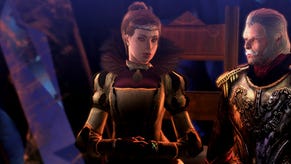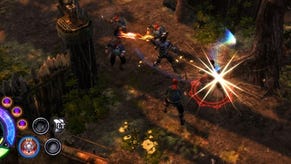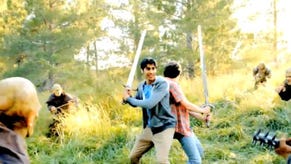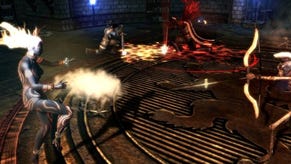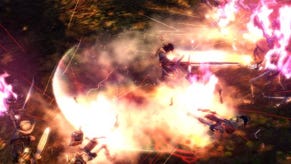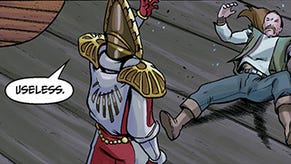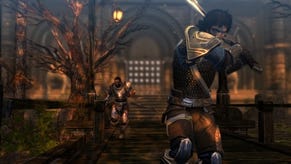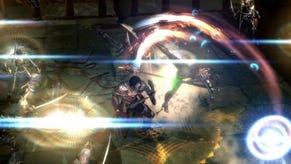Interview: Chris Taylor On Dungeon Siege 3
This was a good one. When I met up with Chris Taylor (of Gas Powered Games and Supreme Commander fame) at GamesCom for my Dungeon Siege 3 interview, it was our respective last days of the convention. My body felt like a trashed and soon-to-be-demolished building, and Taylor was engaged in some kind of mental wrestling match with a hangover. To make matters more awesome, most of Dungeon Siege 3 was (and still is) under wraps, so we quickly moved on to talking about riches and success, and what that meant for game developers. Have a read after the jump.
RPS: So, what's happening with Dungeon Siege 3?
Chris Taylor: Well, my position on the project is like a, Creative Consultant, given my role in the creation of the franchise. Square Enix asked how we'd like to work in collaboration with another studio that they'd found, and I said "That's terrific, who have you got in mind," and they said Obsidian! And I said "That's perfect! Look no further. You've found the best studio for the job. The guys are so talented, and they totally get it, and their working story is right on the money." So I was pretty happy with that.
The next step was that they went through all of our lore, even the stuff that people never hear about- the reason why there's a Stonebridge, or what have you, who's the 10th Legion, who's The Empire of Stars- and then they create their own extension on that fiction, building their own story off of that.
So what I do is I read through all of their material, and I turn it around 180 degrees, and then I provide some editorial feedback for them.
RPS: Are you also involved in the actual design, the mechanics?
CT: No. I look at their design, their mechanics, and then I provide feedback on that.
RPS: You say Obsidian "get" Dungeon Siege. What would you say is the core of Dungeon Siege?
CT: It's an action-RPG gameplay mechanic with lots of loot.
RPS: Tons of loot.
CT: Yeah. Really. And a progression through a world. But while historically we've been light on story, they're going heavy on story. We're trying to pull up our story-pants, and we've made positive steps with each iteration. Our company is very mechanical and technological, so [Gas Powered Games] tend to start with a technological innovation, and then design the game around that. The way Obsidian works, they do a better job of balancing all the various elements. They have a beautiful engine called the Onyx engine which is balanced and really state of the art, and they've got great storytelling, and then they've got good gameplay instincts on top of that.
I daresay they're doing a better job than I would have done. I know that's bull, but it's true, because I've really taken to focusing on RTS.
RPS: So, what are the new features coming with DS3?
CT: Well, I'm not really the guy to talk to about that. I've already said too much. But for my part, I'm really happy. It's a proud moment to see the franchise's name here, there and everywhere, and to know that's something I thought of while I was taking a shower 12 years ago.
RPS: You say you're working on RTS right now, but Dungeon Siege was the RTS spin on RPGs, wasn't it?
CT: Well because it's going to a console there's now less of an RTS spin and more of the single player, direct hero character control.
RPS: Wow. But there's still a party system?
CT: There's a party system there, but it's really tied in nicely to the drop-in-and-play multiplayer. They're doing a nice job. It's seamless, you just pick up the controller and just drop in, drop out, AI takes over the character. It's really cool.
It took a long time for this industry to figure out how important co-operative is versus head to head PvP. People like to play together, you know?
RPS: It's shocking.
CT: I know! But another 100 years go by, what are we gonna discover then?
RPS: Probably that we really like controlling one another. So you've wrapped up Supreme Commander 2?
CT: Supreme Commander 2 shipped in March, and I'm now working on Kings & Castles.
[Here I'm informed that this is a Dungeon Siege interview, and any Supreme Commander or Kings & Castles questions would have to form a separate article.]
RPS: So! How do you feel about Dungeon Siege, looking back on it?
CT: I think we made a game that was bigger than it needed to be, and that delivered more hours of gameplay than people technically wanted. It's important that people get through a game. If somebody stops playing because of the sheer, daunting size of it, they don't advertise the game to their friends, which is a really interesting byproduct of game completion.
Think about a game that you don't get all the way through. You don't talk about it. But the game you get all the way through in 8 hours, you come to the office on Monday and say "Yeah, I got through this, this and this." "How was it?" "Pretty good." "Can I borrow it? Ah, I'm gonna pick up a copy on my way home."
But when you don't finish a game, these kinds of conversations don't happen. You don't market it to your friends.
RPS: I guess if you don't finish a game, you don't finish it for a reason, so the last taste in your mouth...
CT: Is the quitting taste.
RPS: Yeah. You don't finish it because, say-
CT: The end level boss was too hard.
RPS: And when that happens, you don't say "Hey man! You have to play this game. It's probably good. I don't know."
CT: Exactly. "I wouldn't know because I haven't finished it, but you should go buy it."
RPS: Which is funny, because a few years ago some developer over at Ubisoft mentioned that they spend way more man-hours on the first few hours of their game, because statistically that's all most people ever get through.
CT: Yeah, well you do need to make the first 10 minutes great. The first hour great, whatever. But at some level you've gotta make the whole game great, you know?
RPS: What's working as a consultant like? It sounds like a nice position to be in.
CT: Well it could go either way. If you were working with a real crummy developer, it'd be a nightmare. They listen to your comments, then they don't respond to any of it, then they send you back more junk? It'd be Hell on Earth. But with Obsidian, it's really nice. I'm reading through the story work they did like it was a novel. I started reading it not knowing what to expect, and then it was like a page-turner.
RPS: Which was something that was interesting about the original Dungeon Siege. There wasn't much plot there, but what was there was all fairly exciting. Whoever you met reacted to you so strongly.
CT: Well, you know the old saying that necessity is the mother of invention. We had a lot of necessity. We were the underdogs, and still are, frankly, and we had to compete against gigantic, established brands. Every dollar we got, we couldn't just spend on the game. We had to buy chairs, tables, servers, paper plates for the kitchen. And because we owned the IP, we had to go and do the trademark registration all over the world, and that cost a lot of money, and you don't even think of that when you go to do the deal initially.
You have to do so much more as an independent, that you don't even realise because you've never been an independent. We learned by doing.
RPS: Considering the cost of setting up a company, did you turn a profit on the first Dungeon Siege?
CT: Without getting into the confidential business stuff, we did OK.
RPS: What was turning out Dungeon Siege 2 like, compared to the first?
CT: We spent almost 4 years on the first Dungeon Siege and a little over 3 years on the second, which was longer than we thought it was gonna take. We thought we could do it in 2 years. We've really done a lot better lately, we do games in 18-24 months now.
RPS: I was talking to the Torchlight guys earlier today. They turned Torchlight around in 14 months, while Blizzard are taking however long to make Diablo 3.
CT: Yeah, 5 years seems to be the minimum amount of time for a Blizzard game to be made. Different ways of approaching it, you know. If you're in Hollywood you could make an Avatar for $300 million, or you could make a cute little art film with a really cool concept for $100 thousand. They're both entertaining, but one goes on to make $2 billion, and the other goes on to make $10 million, and they're both tremendously successful.
RPS: I've been talking about how the games industry needs more mid-range games. We've got the blockbusters, we've got the tiny indie games, and that's about it.
CT: We're starting to already see it. The iPad and WebGL or HTML 5, that's gonna usher in a new era of that closer-to-midrange game. We're already seeing Xbox Live Arcade games going from a budget of $250 thousand and sliding very quickly towards $2 million. We'll probably see it on the $4-8 million range inside of 3 years.
It's a function of the popularity of the platform that builds the business case. If you have a business case that you can show someone, that you're gonna do $300 million in revenue, it automatically implies a $20-40 million budget game. If the developer says "No, no, I don't want that, I only want $100 thousand!" they'll find a way to spend $28 million on it. Believe me.
RPS: You've had an experience of this?
CT: That's just me talking psychology and business. If you talk to a company that has no money, they have Cake Day to celebrate birthdays once a year. If you have a profitable company they bring in cake every day, for no reason.
The marketplace dictates the kind of product that enters into it. Goldfish grow to fill the pond- you ever heard that? It's more fun to spend money, everything is easier. You have more people, everybody's less concerned. But you know, I've actually learned the folly of that. Instead of having 300 people working on a game, if you can make that game with 28 people that are all close friends, and there's no drama, and no turnover, and you don't spend all your hours in a room interviewing people- and you're gonna hear that from fast-growing companies. "I spend two days out of five in interviews, just to keep up with our growth rate!" Well that's not making games, that's called interviewing people.
RPS: And when you've got that level of dialogue going you also need community managers, QA people.
CT: And we're going down the rabbit hole.
RPS: So, Dungeon Siege 3. Will there be a mule?
CT: No.
RPS: NO!
CT: He'll be making a special appearance! I think there's been enough feedback at the show that it might make a special appearance. I loved it when the pack mule was the only surviving member of the party, and it fought to the death and sometimes won.
RPS: You know, I have this idea for an RPG where you go into dungeons and collect loot, the whole bit, but you don't have any control over the hero. You control his serf. Throwing him weapons, meticulously stacking his loot, telling him to watch out.
CT: Now that's your iPhone game. You couldn't get that game signed on a typical budget, because it's too risky, but on the iPhone, iPad, Facebook, these are great forums for ideas. And then just code it yourself on weekends.
RPS: That's why I like covering the PC now. It has so much freedom for self-publishing for any kind of budget. Why do you choose to work with the PC?
CT: It's the biggest gaming platform in the world. It's really powerful and flexible, and for years it had way more resources than the consoles. It's only recently that the consoles have matched the GPU capabilities of the PC, and of course now the PC's vastly exceeded them again. Like, vastly. But there's no install base for that, so we're back to that least common denominator of 5-7 year-old PC hardware.
You could go in circles all day long. But, y'know, Bobby Kotick was saying that 70% of the revenue at Activision Blizzard is PC.
RPS: They're a special case, though.
CT: Wellll, John Riccitiello [CEO of EA] is trying to make 70% of his revenue come from PC, with his acquisition of Playfish. It's interesting, because the PC is a royalty free, unhindered platform, where the process of registering and shipping a game is not only trivial, you can update it at no fee or cost. There's a tremendous advantage of working for PC.
RPS: Thanks for your time.






